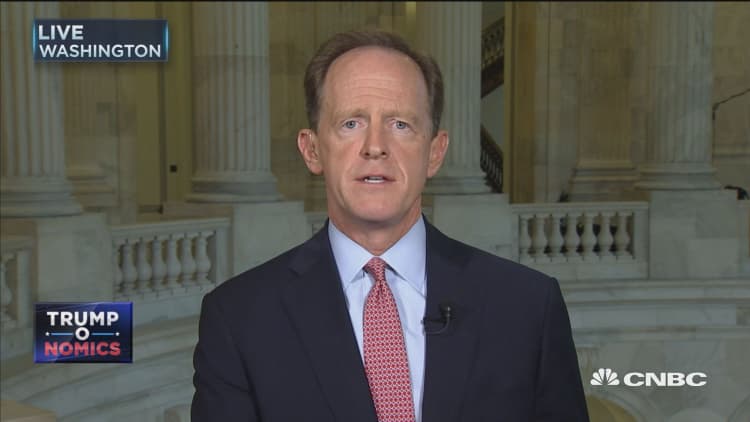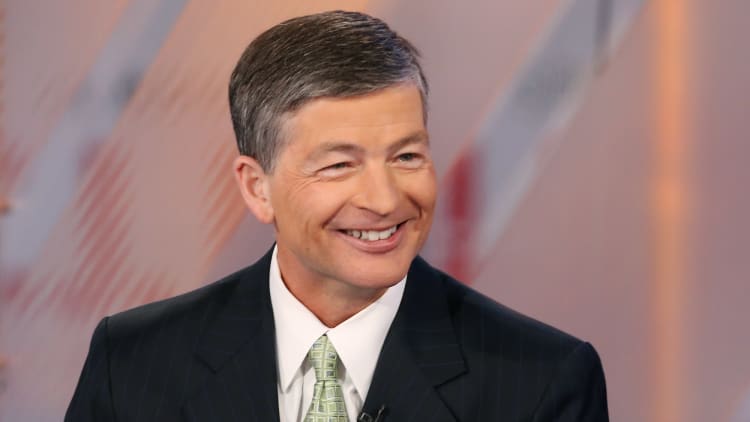House Judiciary Committee Chairman Bob Goodlatte of Virginia announced Thursday that he will retire from Congress next year, the latest member to join the more than two dozen Republicans who've confirmed they won't be returning to Congress in 2019.
"With my time as Chairman of the Judiciary Committee ending in December 2018, this is a natural stepping-off point and an opportunity to begin a new chapter of my career and spend more time with my family," Goodlatte said in a statement.
Retirements in Congress, as in any other job, are part of the natural workplace cycle. But given the nature of politics, they're often carefully timed to benefit lawmakers' future careers. This is especially true in the House, where members must win re-election every two years.
According to Roll Call, an average of 22 House members retire every cycle. So far in the 2018 cycle, that number has jumped to 30 — 21 Republicans and nine Democrats, with more retirements expected later this month.
And while it's tempting to blame the polarizing effect of President Donald Trump on the nation, or the infighting that plagues the House Republican caucus, there's more to it than that.
CNBC is keeping a tally of all the House retirements, sorted into groups based on the reasons behind members' decisions, and what the retirements mean for both parties. Below is the latest.
Half of the House members who've announced they're retiring next year, 15 of the 30, are leaving to run for governorships or Senate seats in their home states, and among those running for governor there's an even party split: five Democrats and five Republicans.
Democratic Reps. Jared Polis, Colo.; Colleen Hannabue, Hawaii; Tim Walz, Minn.; John Delaney, Md.; and Michelle Lujan Grisham, N.M., have all thrown their hats in the ring, as have Republicans Kristi Noem, S.D.; Steve Pearce, N.M.; Diane Black, Tenn.; Raul Labrador, Idaho; and Jim Renacci, Ohio.
Another six House members are leaving to run for Senate seats: four Republicans and two Democrats.

Of the Republicans, two members from Indiana, Todd Rokita and Luke Messler, have already announced they'll retire to seek the Senate seat currently held by Sen. Joe Donnelly, D-Ind., considered among the most vulnerable in 2018.
In Pennsylvania, Republican Rep. Lou Barletta is hoping to unseat Sen. Bob Casey (D) while in West Virginia, Rep. Evan Jenkins (R) is leaving to run against incumbent Sen. Joe Manchin (D).
On the Democratic side, freshman Rep. Jacky Rosen plans to mount a campaign in Nevada for Republican Sen. Dean Heller's seat. Rosen's fellow Western state Democrat, Texas Rep. Beto O'Rourke, will retire to challenge former 2016 presidential hopeful Sen. Ted Cruz (R).
The remaining House retirements reflect more complex motivations. Some members really do retire to spend more time with their families. Other lawmakers departing next year are facing long odds for re-election, or grueling primary contests.
Still more, like Goodlatte, are coming to the end of their terms as committee chairmen, which in many cases are limited by House rules. These members likely recognize that their prospects for future employment (and compensation) are a lot better if they depart at the height of their power.
Since the first of the year, 12 House Republicans have announced their retirement for reasons other than mounting a campaign for higher office.
They include Goodlatte, Frank LoBiondo, N.J.; Lynn Jenkins, Kansas; John Duncan, Tenn.; Dave Trott, Mich.; Dave Reichert, Wash.; Ileana Ros-Lehitnen, Fla., and Charlie Dent, Penn., as well as four Texas Republicans: Jeb Hensarling, Ted Poe, Lamar Smith and Sam Johnson.
Of these, three are term-limited committee chairmen: Hensarling, who chairs the House Financial Services Committee; Smith, who heads the House Science, Space and Technology Committee, and Goodlatte.
Democrats so far have announced just two members retiring for personal reasons: New Hampshire Rep. Carol Shea-Porter and Massachusetts Rep. Niki Tsongas.
This imbalance is partly due to the historical precedent of weak midterm election results by whichever party controls the White House.
The re-election of President George W. Bush in 2004 was instrumental in flipping the House and Senate to Democrats in 2006, while the election of Barack Obama in 2008 was a driving force behind the 2010 Republican landslide known as the Tea Party Revolution.
In 2018, a shift in the other direction might be dubbed the Trump slump. With approval ratings at historically low levels, Trump and the Republican Party will have to thread a needle in order to hold many of the competitive seats that Republicans are vacating.
So far, at least eight Republicans will retire from House seats that are considered competitive, according to the nonpartisan Cook Political Report. By contrast, only four competitive seats have been put in play due to Democratic retirements.
In Goodlatte's home state of Virginia, Democrat Ralph Northam's resounding victory in the Nov. 7 gubernatorial election reflects some of the challenges facing the Republican party next year, especially in suburban congressional districts that mirror the makeup of the Virginia suburbs outside Washington, D.C.
"This is what a wave feels like," former Republican Rep. David Jolly of Florida said on MSNBC, shortly after Northam declared victory over Republican Ed Gillespie. "Democrats won tonight because Donald Trump is president. And that's what Republicans need to reconcile with."
Others in the GOP blamed Gillespie's loss on Trump's divisive campaign style, more than on the president himself. "Ed Gillespie lost the race because, at least through his ads, he tried to divide and conquer. He ran this nativist campaign that was very divisive," Rep. Carlos Curbelo, R-Fla., told NBC News.
But Trump and his allies saw things the opposite way and blamed Gillespie's loss on the candidate's failure to fully "embrace" Trump. "Ed Gillespie worked hard but did not embrace me or what I stand for," Trump tweeted on election night.
Whatever the reasons, they are unlikely to impact how many of the congressional districts, like Bob Goodlatte's, vote in next year's elections.
Located in the southwest corner of the state, Virginia's Sixth District hasn't backed a Democrat for president since Lyndon Johnson. The last time a Democrat represented the district in Congress was 1993, when Rep. Jim Olin retired and Goodlatte won his seat.
WATCH: Hensarling on his impending retirement

Correction: This story has been updated to reflect that Republican Kristi Noem is the representative for South Dakota.


